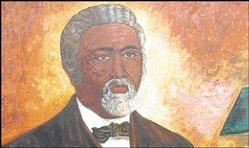By Billy Hall, Contributor
This portrait of George Liele hangs prominently in the halls of the East Queen Street Baptist Church, in Kingston. - Norman Grindley /Staff Photographer
THREE BAPTISTS are among Jamaica's seven National Heroes but there should be a fourth - George Liele (1750-1828). This pioneer of Baptist witness in Jamaica, among several other pioneering achievements of Jamaican and international acclaim, is fully deserving of Jamaica's highest honour.
Already, Paul Bogle, for his principled stand and bloody struggle, George William Gordon, for his social critique and resultant martyrdom and 'Daddy' Sam Sharpe, for his organising genius and leadership in bloody conflict, have been recognised as National Heroes.
But the name and exploits of George Liele are hardly known, much more heralded. Even a cursory glance at the best of Jamaican history books, including the most recent, will reveal this deficiency.
In 1982, the Rev. Clement Gayle made an invaluable contribution to this hiatus when he produced the book, George Liele: Pioneer Missionary to Jamaica. Rev. Mr. Gayle was then the Lecturer in Church History and Homiletics at the United Theological College of the West Indies.
Gayle's book, while not a polished professional work, must be highly credited for pioneering value and as a source for future research. Indeed, an updated or improved version would be a good move for Liele's greatness needs to be more told, better told, and more recognised.
Liele came to Jamaica in 1783 when slavery was in full force, and would not be finally abolished in another 55 years. At that time, the established Anglican Church prevailed and slaves were not their focus.
But Liele and his close associates, Moses Baker and George Gibbs, made the slaves their full focus. Indeed, their preaching to the benighted blacks was a source of consternation to the white plantocracy.
Never before had the slaves seen blacks preaching Christ. The historian, W.J. Gardener, noted the "novelty of the spectacle" as "multitudes were attracted to the free black preachers".
Religion before was prominent in Jamaica, from the very beginning, dating for historical discussion purpose from white
discovery and dominion. Columbus had brought with him two Catholic priests in 1494 when he first landed here. And when Admiral Penn and General Venables took over Jamaica from the Spaniards, they brought with them seven Anglican priests.
Liele, unlike all other 'religionists' to visit Jamaica before, came voluntarily, not part of the 'establishment', of the same colour as the majority, and did not operate as a landowner or slave trader.
His presence excited the masses, and within a few years his first congregation at East Queen Street swelled to approximately 500 members. This was the first Baptist church established in Jamaica.
AN INDELIBLE MARK
Liele had come from the USA where already his life and witness made indelible mark upon US history. He is recognised today as the first ordained black preacher in America, the pioneer of the Black Church in the USA.
His conversion at age 23 so transformed his life that his master freed him to preach the gospel. He came to Jamaica as America's first missionary overseas thirty-three years before Adoniram Judson sailed for Burma and became hailed in missions history as the Father of American Missions.
THE WAR OF INDEPENDENCE
In his native Georgia he had preached throughout the War of Independence, and attracted an impressive number of followers. This led to his establishing, in 1779, along with one of his followers, Andrew Bryan, the first Black Baptist Church in America.
When he came to Jamaica in 1783, he began preaching in the dusty streets of Kingston, and gradually reached into the canefields in neighbouring parishes, eventually witnessing islandwide.
Three Moravian missionaries had preceded him, but they were from Germany, white, kept slaves, operated in one parish (St. Elizabeth), and enforced such restrictions that their growth was slow and minimal. They did not excite the masses.
The impact of Liele approximately 30 years later was startling and substantial. The plantocracy were so alarmed that they began to fear the uprising of the slaves.
Not surprisingly then, the local Legislature passed a law to effectively put an end to all non-conformist preachers, for Methodists had arrived in 1798 and had begun to make an impact among mulattos.
The law required all non-conformists (non-Anglicans) to get a licence to preach, from the Bishop of London, in London. While the white non-conformists were prepared to challenge the law, the blacks (Baptists) were in no such position.
However, one of their member made a master move by writing to the British Baptists for help. In response, the Baptist Missionary Society (BMS) in England sent their first missionary to Jamaica John Rowe. He arrived in 1814 but died of a fever in 1816.
The BMS sent successors, and they did noble, spiritual work, leading in the struggles that led to the Emancipation of slavery in 1838.
RADICAL MISSIONARY EXPLOITS
His missionary exploits, in America and in Jamaica, his adopted home, and base for missions action, were radical and remained impressive. His life and work make him unique and outstanding in America and Jamaica.
In popular missions history, William Carey of England is hailed as the 'Father of Modern Missions', from the Western World. But Carey did not sail from England to India until 1892.
In 1966 the East Queen Street Baptist Church established the George Liele Education Centre. But much more needs to be done - much more - for George Liele deserves recognition as a National Hero.

